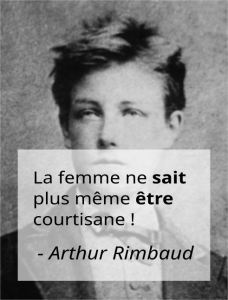French helping verbs (semi-auxiliaries)
Les semi-auxiliaires
Salut, and welcome to our lesson about French helping verbs at Language Easy! Helping verbs include auxiliaries (être and avoir) and semi-auxiliaries (all the other ones). We already presented auxiliary verbs in our previous lesson, so here we’ll concentrate on semi-auxiliaries.
Allez, on y va !
What are the French helping verbs?
Que sont les semi-auxiliaires ?
Let’s first make a reminder of what a helping verb is:
French helping verbs or auxiliary verbs (les auxiliaires) are verbs that can be conjugated in association with another verb to express a nuance in the action of that verb. That other verb is called the lexical verb (le verbe lexical).
In such a construction,
- the helping verb comes first and can be conjugated;
- the lexical verb comes last and is at impersonal form, i.e. infinitive or participle.
Remember, être (to be) and avoir (to have) are categorized as auxiliaries while all the other verbs are called semi-auxiliaries. The difference between is that the auxiliaries are used to construct specific grammatical forms (such as compound tenses, or the passive voice) while the nuance brought by semi-auxiliaries is more of a semantic nature.
As we already studied auxiliaries in our previous lesson, here we’ll focus on semi-auxiliaries only.
The most common semi-auxiliaries are aller (to go), venir (to come), pouvoir (to be able to), devoir (to have to), vouloir (to want), savoir (to know), laisser (to let) and faire (to do / to make).
Let’s see a few examples before we start:
- Un ange passe. → Laisse passer l’ange!
A angel is passing by. → Let the angel pass by! - Pierre cuisine très bien. → Il sait cuisiner très bien!
Pierre cooks very well. → he can cook very well! (lit. he knows to cook very well)
aller, venir, passer, monter, descendre
Aller, venir, passer, monter, descednre
The verbs aller (to go), venir (to come) as semi-auxiliaries introduce a geographical movement made in order to make the action possible: come here so you can do this, go there so you can do that.
The idea is the same as in English with the helping verb “to come” or “to go” while the construction is a bit different:
- Viens me chercher à midi, s’il te plaît!
Come fetch me at noon, please! (lit. come and look for me at noon) - On ira faire des courses.
We will go shopping. (lit. We will go to do shopping)
The verbs aller and venir have another special usage as auxiliaries as they are used in the construction of two pseudo tenses: the near future (futur proche) with “aller”, and the recent past (passé récent) with “venir de“.
- Marc et Julie viennent d’arriver il y a à peine dix minutes…
Marc and Julie just arrived ten minutes ago only… - Mais j’espère qu’ils vont repartir très vite !
But I hope they are going to go very soon! - Demain, on passera dire bonjour à Pierre.
Tomorrow, we will go say hello to Pierre. (lit. we will pass to say hello to Pierre.)
See our article Futur proche et Passé récent to see more examples of this particular use of those two French helping verbs,
Other verbs expressing the same idea of the need of a geographical movement prior to the action are possible to use as helping verbs: monter (to climb, to go up), descendre (to go down) and passer (to pass), rentrer (to come in), sortir (to go out)…
Let’s illustrate this:
- Il pleut dehors, rentre t’abriter!
It’s raining outside, come shelter inside! - Personne n’est sorti promener le chien aujourd’hui?
No-one went walk the dog today? - Il faudrait que quelqu’un monte au grenier me passer le tournevis.
Someone should come up and give me the screwdriver. - Marc a demandé à Hélène qu’elle descende la rejoindre à la cave.
Marc asked Helen that she go down to meet her in the cellar.
The helping verb passer can be used to express the same idea as aller or venir, the subtle difference being that instead of asking that someone initiate a trip to do the action, that trip is already planned or being done and a detour is asked for.
vouloir, pouvoir, devoir, and savoir
Vouloir, devoir, pouvoir et savoir
The verbs vouloir (to want), devoir (to have to), pouvoir (to be able to), savoir (to know) can be used as helping verbs to express the same relation to an action their original meaning describes.
Before looking at these examples, can you try and come up with one of your own for each of these verbs?
- Comme je voudrais être riche pour ne plus devoir travailler…
How I would llike to be rich so I don’t have to work anymore… - Tu peux faire tout ce que tu veux, tant que tu sais le faire.
You can do whatever you want, as long as you know how to do it.
laisser, faire and se faire
Faire et se faire
The French helping verbs laisser (to let), faire (to do) are used when the subject, or the doer of the action is something or someone else: to let something happen, to have something done.
The famous song from the Beatles would translate as:
- Laisse faire, laisse faire, laisse faire, laisse faire…
Let it be, let it be, let it be, let it be… (lit. let do)
The English expression “to have (someone) do something” is perfectly translating using the semi-auxiliary faire in a perfectly distinct grammatical structure:
- Fais-toi couper les cheveux par ton coiffeur !
Have your hairdresser cut your hair! (lit. Make yourself cut your hair by your hairdresser) - Nous ferons venir les ouvriers le lundi.
We will have the workers come on Monday.
But not only:
- Hélène s’est faite renverser par une voiture.
Hélène was hit by a car. (lit. she had herself knocked over by a car) - Le conférencier m’a fait changer d’avis sur l’écologie.
The lecturer made me change my mind about quantum physics.
What’s next?
C’est quoi, la suite ?
Et voilà, we reached the end of our lesson about French auxiliary verbs. You will now be able to introduce nuances to your verbs in a lot of different ways, which is cool! For our next lesson, we will study a different family of verbs : the impersonal verbs. See you there!
Allez, à bientôt !



